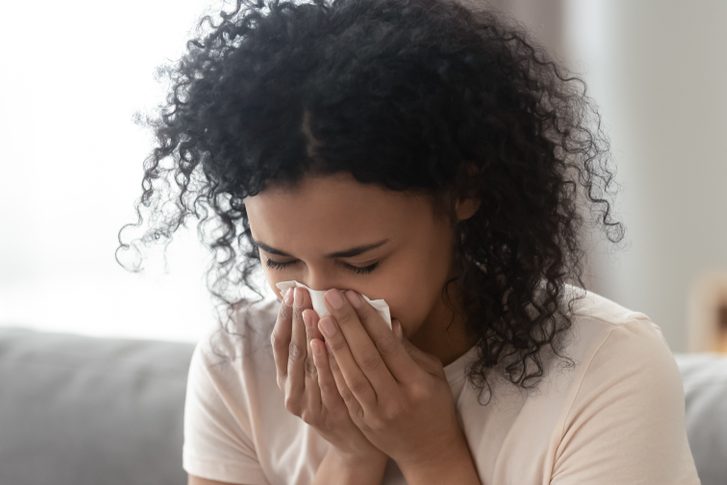
Unwashed Sheets Can Do More Damage to Your Health Than You Think–Here’s What You Can Do to Avoid That

There’s nothing quite comforting and relaxing as getting to snuggle in a bed of freshly washed sheets. And as it turns out, this little hygiene and self-care habit can also spell good news for one’s overall health. According to some health experts, sleeping in sheets that haven’t been washed in quite a while, may not be the best idea.
The Dangers

fizkes/Shutterstock
Are your allergies flaring up more than usual? Dirty bedding may be the culprit.
Humans typically shed about 200 million dead skin cells in just an hour totaling to more than a billon a night. Thus, it’s not surprising that bed sheets can get pretty icky in a matter of a few weeks or days.
What more, this shedding attracts tons of eight-legged dust mites that may cause health issues. While they don’t really carry diseases, mites can trigger allergies, according to the Asthma and Allergy Foundation of American (AAFA). People who don’t wash their bedding regularly may then experience wheezing or a runny nose.
Sheets can also get dirty as people often take dirt they’ve acquired throughout the day to bed. This includes environmental pollutants, makeup residue, lotion, and many others. There’s also the built-up body oils, sweat, and even pet dander. All these can contribute to a variety of skin problems like irritation and acne breakouts.
How Often to Wash

Photographee.eu/Shutterstock
Sharing a bed with another person can get sheets dirty faster.
To counter these negative consequences, people are recommended to wash their sheets more often. P&G Fabric Care’s Laura Goodman, M.S. particularly advises changing and washing bedding every one or two weeks.
However, she emphasizes that those who have a habit of sleeping in the nude or with pets might want to do their laundry at least once a week as these habits can dirty one’s bed at a faster rate. Another tip is for acne-prone people in particular. According to the American Academy of Dermatology (AAD), those who experience breakouts might want to clean their pillowcases, in particular, at least two to three times a week.
Wash Tips

Artazum/Shutterstock
Be sure to follow the correct washing instructions for specific bedding material when doing laundry.
While washing sheets more often is a simple enough solution, not everyone has the time to do so. What more, many people rely on laundry shops that may be a good distance from home to clean their clothes and sheets.
So, instead of washing one set of bedding over and over, experts suggest people keep at least three sets of sheets on hand to avoid sleeping in a dirty bed. It’s also advisable to do laundry at the hottest washing temperature setting as this will kill dust mites. Lastly, refrain from putting too much cleaning detergent in a wash load as residue soap can actually become stuck in the sheet’s material and also cause skin irritations, later on.
More in Health & Well-being
-
`
Here’s Everything You Need to Know About Open Relationships
An open relationship is a consensual arrangement where partners agree to engage in romantic or sexual relationships with other people. Unlike...
June 6, 2024 -
`
Explore the Multifaceted Goals of Meditation
What is the goal of meditation? If you have ever found yourself asking this question, you are not alone. Meditation has...
May 31, 2024 -
`
When is National I Love You Day Celebrated? Mark Your Calendar
Life can get hectic, and sometimes amidst the daily grind, we forget to express our love and appreciation for the phenomenal...
May 23, 2024 -
`
When’s the Best Time of Day to Fish?
For any angler, a successful fishing trip hinges on several factors. But one of the most crucial elements is timing. Knowing...
May 14, 2024 -
`
What Mental Illness Does Britney Spears Have? Discovering the Answer
Britney Spears, a name that resonates with millions around the globe, goes far beyond the glitz and glamour of her stardom....
May 7, 2024 -
`
Here Are Some Easy Ways To Say No To Unrealistic Expectations In Your Relationship
If you are in a relationship, you should constantly work on improving it. Some early lovebirds fall in love too quickly...
May 3, 2024 -
`
Therapy? Medication? What Are the Treatments for PTSD
Post-Traumatic Stress Disorder (PTSD) is a common after-effect of traumatic events. It can be a debilitating condition, but the good news...
April 25, 2024 -
`
Courting vs Dating – Which Relationship Path is Right for You?
In today’s fast-paced world, the terms ‘courting’ and ‘dating’ often swirl around in conversations about relationships. While some people may use...
April 23, 2024 -
`
Essential Mexico Travel Tips for a Seamless Adventure
Mexico, a land of vibrant culture, breathtaking landscapes, and mouthwatering cuisine, beckons travelers from across the globe. But before you embark...
April 16, 2024















You must be logged in to post a comment Login